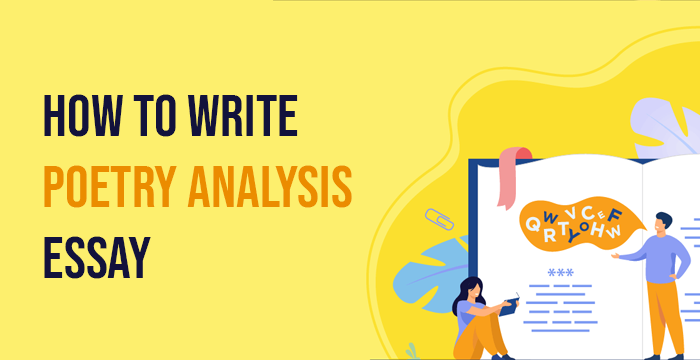
Poetry analysis involves breaking down the components and features of a poem and examining them in-depth individually to achieve a comprehensive analysis of a poem. It is similar to poetry review in the sense that it requires personal opinions of the essayist. However, poetry analysis is much more objective and deep. Tensed? Don’t worry, in this blog we have got for you a complete guide about how to write a poetry essay including poetry analysis structure, process, element, tips and tricks.
What is a Poetry Analysis in simple words?
A poetry analysis is a detailed examination of a poem including its theme, rhythm, language, structure and context. It entails going beyond the said words to find out what the author truly means by reading between the lines. E.g. When Robert Frost writes “(I have) miles to go before I sleep”; sleep does not mean literal napping, it refers to death. Similarly, many times poets might mean more than one thing through figurative language. Poetry analysis involves highlighting all the meanings the lines convey. It should be able to assess the style of the write-up. Read a poem analysis example to get a better idea of the term.
What are the elements that make up a poetry analysis?
A good analysis consists of diverse aspects of a poem concerning both formal and content-related elements. It brings to fore any unique ideas or aesthetics employed in the poem. The following are the basic elements that will guide you about how to analyse poetry:
1. Summary
Generally, after the introductory paragraph, the analyst summarizes the poem line by line. Summary is nothing but the overview of the poem. It simplifies the content of the poem in the prose form.
2. Theme
Every poem is based on a theme. Theme is the general thought behind the poem. A poetry analysis does not merely state the theme but also ponders upon how the author has brought out the theme in the poem.
3. Structure
It refers to the composition of the poem. A poem might consist of stanzas of equal or unequal lengths or be in free verse. It is important to determine why the author has chosen the particular format and how it affects the content of the poem.
4. Figures of speech
Metaphor, simile, climax, antitheses, repetition, etc. are the figures of speech employed in poems for different effects. Marking out those poetic devices and assessing their impact makes a crucial part of poetry analysis.
5. Context
Each poem has a background to it. When William Wordsworth wrote ‘Daffodils’ he was reacting to the disasters created by the industrial revolution. To study the context of the poem, one should situate the poem in its social, political and cultural context.
6. Rhyme and Meter
Rhythmic qualities make a poem different from a prose. Poetry has a certain rhyme scheme that is generated through the use of rhyming words. A poem in blank verse does not follow a rhyme scheme but still inherits a metrical pattern. Meter is discovered through the analysis of the pattern of stressed and unstressed syllables. For e.g. Milton’s ‘Paradise Lost’ is entirely composed in iambic pentameter. Free verse poems are devoid of both rhyme and meter.
7. Language
Identifying the language of the poem is key to poetry analysis. A poet might use straightforward or figurative language to make his/her point. Also, the language can be subtle or bold.
8. Tone and Mood
Tone is the emotion poured by the writer in the poem, while mood is the resulting emotion the piece arouses in the reader. Some examples of tone and mood can be happy, sad, melancholy, inspirational, etc.
9. Personal take
Finally, a successful analysis comprises personal views of the analyst. While examining the poem, the writer can jot his/her comments on the style of the writer and comment on the strengths and limitations of the work.
A sound analysis of a poem includes all these aspects but is definitely not limited to them. Some other factors like a poet's background, ideology, etc can greatly affect some poems. Also, the individual composing the analysis should be careful about the amount of weightage given to the elements. Consistency should be maintained along with highlighting the unique aspects.
If you are feeling it burdensome to analyse a poetry in such great detail or finding it tough and tiring, you can reach out to the expert writers at The Assignment Ninjas for help. Our subject-professionals will take care of your assignment and compose a high-scoring paper for you.
Structure of a poem analysis:
A poetry analysis essay follows a typical three-part structure: Introduction, Body and conclusion. We’ll now take you through a step-by-step guide on how to write a poetry analysis.
Introduction:
Introductory paragraph outlines which poem you have chosen for analysis. It will mention basic details like the name of the poem, author, time of publishing and any other interesting facts about it. It will also incorporate a brief background of the work and a line or two on its theme.
Body Paragraphs:
The entire analysis and reviews will go in the body paragraphs. Body usually begins with the summary of the poem and then goes into other details. Any important secondary critique and personal opinions can also be included here. However, utmost care should be taken to maintain objectivity.
It is a wise practice to begin body paragraphs with a topic sentence and end with a transition sentence. Topic sentence tells what the paragraph is about and a transition sentence hints at what will be coming in the next paragraph. It ensures smooth flow and promotes readability.
Conclusion:
The concluding paragraph combines all the analysed elements into a whole and comments on the main idea of the poem. Nothing new should be stated here. It offers a recap of the study and reiterates the main points. The value and quality of the wok can be measured in this last part.
Steps to write a poetry analysis essay:
So how to write an essay about poetry? That is the question. Directly picking up a pen or hitting the keys on the keyboard will leave you puzzled and disgusted. It is wiser to follow a proper process to articulate a good analysis in a hassle-free way. Here’s how you can do it.
1. Carefully select a poem
If the choice of poem is left up to you, select a poem you have previously studied. Ensure that it has enough substance to analyse. You can shortlist a few good poems and then make your final decision.
2. Read it multiple times
Read the poem line by line and word by word. Read it aloud to get an idea about the subject, language, rhyme and meter. It is better to go though poem analysis examples to understand the requirements and organization of this type of essay.
3. Take primary and secondary notes
Jot down your primary understanding of the elements of the poem mentioned above. Underline any significant or unique characteristics of the poem. Go beyond the primary text and read some secondary research materials on it. It will broaden your perspective and enhance the quality of your essay.
4. Draft an outline
Make a rough outline of your composition. Determine what all will go in the introduction, body paragraphs and conclusion. Finalize the sequence of your analysis. Having a rough skeleton greatly helps during the writing process.
5. Write the essay
Now begin writing the actual essay. Use clear and understandable language. Include all the necessary elements along with your personal views. Avoid unnecessary repetition. Try to infuse novelty in your write-up.
6. Edit and Proofread
After finishing, reread the entire piece. Find out if any point is overemphasized or something is left out. Reconsider the word choice to convey your points rightly. Proofread for grammatical errors and punctuation. These small steps can highly influence your marks.
Analysing poetry helps to get a comprehensive understanding of the work. It develops critical thinking abilities and opens up new horizons of research. Make sure to assess each aspect of the poem and combine them to present the central idea. Follow the correct format. Refer to additional tactics and procedures mentioned above to compose a winning essay.
If you feel stuck at any point of time or find it difficult to articulate a good essay in limited time, you can always ask The Assignment Ninjas for help. Our experts will write a high quality analysis according to your guidelines in a short time clearing your way to score outstanding grades!


